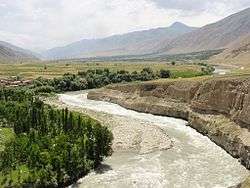Kokcha River

The Kokcha River Persian: رودخانه کوکچه is located in northeastern Afghanistan. A tributary of the Panj river it flows through Badakhshan Province in the Hindu Kush The city of Feyzabad lies along the Kokcha. Near the village of Artin Jelow there is a bridge over the river.[1]
The Kokcha River valley is known for its lapis lazuli mining in Badakshan province. Found in limestone these deposits in the mines of Sar-e-Sang were being worked as early as the 3rd millennium BC[2] and the Kokcha River valley is considered one of the world's leading areas of mining this reserve.[3] The valley was the source of lapis for the ancient Egyptian and Mesopotamian civilizations, as well as the later Greek and Roman. During the height of the Indus valley civilization about 2000 BC, the Harappan colony now known as Shortugai was established near the lapis mines.[4]
More recently, during the 1980s conflict with the USSR, Afghanistan resistance fighters disassembled unexploded Soviet landmines and ordnance and used the scavenged explosive to help mine lapis along the Kokcha to further fund their resistance efforts.
See also
References
- ↑ Adamec, Ludwig W., ed. (1972), Historical and Political Gazeteer of Afghanistan, 1, Graz, Austria: Akadamische Druck-u. Verlangsanstalt, p. 25
- ↑ Moorey, Peter Roger (1999). Ancient mesopotamian materials and industries: the archaeological evidence. Eisenbrauns. pp. 86–87. ISBN 978-1-57506-042-2.
- ↑ Oldershaw, Cally (2003), "Lapis Lazuli", Firefly Guide to Gems, Toronto: Firefly Books.
- ↑ Bowersox, Gary W.; Chamberlin, Bonita E. (1995), Gemstones of Afghanistan, Tucson, AZ: Geoscience Press
External links
| Wikimedia Commons has media related to Kokcha River. |
Coordinates: 37°09′50″N 69°24′07″E / 37.1639°N 69.4020°E